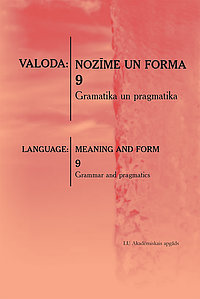Syntactic and pragmatic functions of the Latvian indeclinable participle in -ot(ies)
Syntactic and pragmatic functions of the Latvian indeclinable participle in -ot(ies)
Author(s): Ilze Lokmane, Andra KalnačaSubject(s): Syntax, Semantics, Pragmatics, Stylistics
Published by: Latvijas Universitātes Akadēmiskais apgāds
Keywords: indeclinable participle; linking; raising; control; agent; subject; object;
Summary/Abstract: Although the semantic, syntactic and especially pragmatic functions of the participles constitute a significant aspect of the sentence structure and also play a role in the area of stylistics, in Latvian linguistics, they have not yet sufficiently explored. Traditional Latvian grammars provide descriptions of the tense, aspect and voice meanings of the participles, while their pragmatic aspects largely remain unexplored. This study attempts to describe and classify syntactic constructions that involve the Latvian indeclinable participle in -ot(ies). The description of such constructions enables one to see whether the participle in -ot(ies) can be used in subjecthood tests to determine the subject of the sentence, especially in the cases of the non-canonical subject (e.g. the dative).With regard to pragmatics, it is important to understand why there is an increase in the use of the constructions involving the participle in -ot(ies) in Modern Latvian in various texts types and styles. The participle in -ot(ies) is sometimes used against the principles of efficient language use because it renders the link between the action and its subject unclear and thereby hinders the perception of the content of the sentence. The possible reasons are clumsy translations from other languages (especially in the mass media and various applied texts), also the linguistic skills of the native speakers concerned, for instance, an insufficient mastery or careless use of syntactic constructions.
Journal: Valoda: nozīme un forma
- Issue Year: 2018
- Issue No: 9
- Page Range: 96-111
- Page Count: 16
- Language: English

